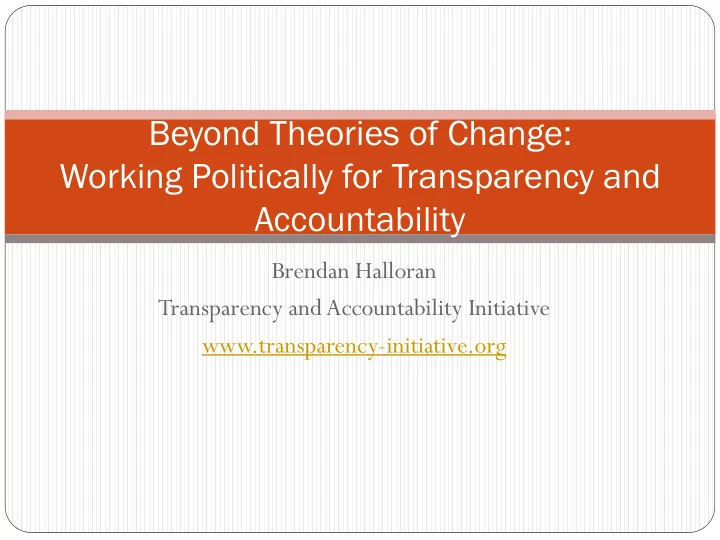

Beyond Theories of Change: Working Politically for Transparency and Accountability Brendan Halloran Transparency and Accountability Initiative www.transparency-initiative.org
Background Transparency and Accountability Initiative (T/AI) TALEARN community of practice http://www.transparency-initiative.org/news/talearn-annual- workshop Thinking and Working Politically (TWP) http://www.transparency-initiative.org/wp- content/uploads/2014/05/Thinking-and-Working- Politically.May-2014.pdf
Caveats Work in progress Generality vs. Specificity I want to learn, from you!
Outline Defining TWP Working Politically Theories of Change Learning Practice
Thinking Politically Politics Relationships Power Examples: formal elections, community decision making on resources, informal relationships and power networks, incentives and organizational culture in public institutions Why politics? http://politicsgovernancedevelopment.wordpress.com/2013/10/2 3/politics-political-change-and-international-development/ How do your organizations think about politics?
Thinking Politically Beyond Political Economy Analysis (PEA) PEA: incentives, interests, constraints Goal: behavior change of key actors Political analysis: power, agency, structures, ideas Goal: political change through navigating an evolving context Hudson and Leftwich: http://www.dlprog.org/publications/from-political- economy-to-political-analysis.php How does your organization analyze politics and power?
Thinking Politically about Government Responsiveness Beyond Feedback Loops One channel/mechanism for citizen-state interaction Need to better unpack the ‘black box’ of responsiveness and accountability Lots of assumptions about the relationships between transparency/openness, citizens/civil society, and more responsive and accountable governance Especially around use of technology for citizen voice/gov responsiveness http://politicsgovernancedevelopment.wordpress.com/2014/07/03 /closing-feedback-loops-again/ How does your organization unpack ‘government responsiveness’ and ‘political will’?
Thinking Politically about Government Responsiveness Short vs Long Routes to Responsiveness + Accountability Short route can, under the right circumstances, result in better service delivery Which circumstances? See Kosack and Fung http://www.archonfung.net/docs/articles/2014/FungKosack.AnnRevP STransparencyGoverance2014.pdf But be careful http://www.makingallvoicescount.org/blog/so-theres-a- short-code-route-of-accountability-really/ But only long route can address equality, justice, rights, poverty…and service delivery WDR 2004 http://www.dlprog.org/opinions/politics-shape-services-and-services- shape-politics-.php
Thinking Politically about Government Responsiveness Accountability ecosystems Mapping and analyzing actors, institutions, mechanisms and processes (state, civil society, citizen and social movements, external actors and initiatives) E.g. elections, informal power relationships, parliamentary oversight, media watchdog, citizen protests, funding mechanisms, Open Government Partnership International Budget Partnership http://internationalbudget.org/wp-content/uploads/IBP-Annual- Report-Final-web.pdf MAVC Transparency and Accountability Initiative Who are the relevant actors, state and civil society, in your organization’s accountability ecosystem?
Thinking Politically: So What? Challenge of translating political thinking into politically- informed practice Where to start? How to work differently?
Politically-Informed TOCs What is a TOC? Framework for thinking about how change happens and what role an organization plays in contributing to change Duncan Green http://oxfamblogs.org/fp2p/tag/how-change-happens/ Theory, hypothesis or hunch? Tiago Peixoto http://democracyspot.net/2014/02/08/the-problem-with-theory-of- change/ Does your organization have a TOC? How does it frame success, change and impact?
Politically-Informed TOCs TOCs should integrate the available theory and evidence about how change happens Collective action http://www.tandfonline.com/doi/abs/10.1080/14649880701371067# .U82HtPldVDA (paywall) Citizen-state relationships http://web.iaincirebon.ac.id/ebook/moon/Community- Citizen/Cornwall%20intro.pdf Power dynamics http://www.powercube.net/wp- content/uploads/2009/12/finding_spaces_for_change.pdf What kinds of evidence are relevant to your organization’s TOC?
Politically-Informed TOCs TOCs should be grounded in a realistic assessment of politics and power Unpack ‘black boxes’, identify important assumptions Deeper analysis and continuous ‘scanning’ TOCs should be adaptable Do assumptions hold true? Has context shifted? What new opportunities/constraints? Need to integrate learning
Politically-Informed TOCs What and How of change Beyond Information + Participation = Accountability Anuradha Joshi http://gpsaknowledge.org/events/gpsa-webinar-how-to-account-for- context-using-a-causal-chain-approach-in-social-accountability/ Linear vs. non-linear change Need to consider multiple potential pathways and scales Beyond exclusive focus on formal institutions Understand the informal and political dimensions How does your TOC envision change will happen? What are the assumptions in that framework?
Learning Beyond Evaluation Learning is more than doing research (or being researched) Roche and Kelly http://www.dlprog.org/publications/monitoring-and- evaluation-when-politics-matters-notes-from-program- experience.php Monitoring and ‘real time’ evaluation International Budget Partnership http://internationalbudget.org/what-we-do/major-ibp- initiatives/learning-program/
Learning Ongoing political analysis Reflecting on practice and experience Culture of critical inquiry Learning practices, capacities, processes, strategies GPSA http://gpsaknowledge.org/forums/topic/what-how-and-why- to-monitor-and-learn-from-social-accountability-projects/ What does learning mean to you? How does your organization learn? How does it integrate learning into practice?
Learning: Incentives How are funding priorities, strategies, processes and relationships encouraging and supporting learning? Or are there disincentives for learning? Encouraging adaptation or pre-defined outputs and objectives? M&E focused on accountability to donor or organizational learning? Reporting as ‘I did what I said I would do’ or ‘I did what made the most sense, and here’s why’? http://algoso.org/2013/01/16/pritchett-feedback-loops-and-the- accountability-conundrum/ Hewlett and T/AI study How does GPSA encourage (or discourage) learning?
Politically-Informed Practice Mwananchi programme http://www.mwananchi-africa.org/ Not simply a matter of citizens holding public representatives to account, but rather a more complex set of relationships between diverse actors in which mutual trust is key to facilitating shared expectations and collective action Local partners as ‘political entrepreneurs’ not ‘grant implementers’ Complex, and potentially conflicting, incentives that influence citizens and government representatives Need to analyze which actors can affect change, and the incentives that influence them doing so or not (develop this capacity) Navigate complex contextual dynamics, and create flexible and adaptable theories of how change can happen that are informed by political analysis
Politically-Informed Practice SAVI (State Accountability Voice Initiative) Nigeria http://savi-nigeria.org/ Building local capacity for analyzing political context and shaping their strategies and tactics accordingly Working with broad collection of actors from both state and society Mixed teams at local level facilitating and mentoring collaborative action around priorities of both government and citizens Foster skills, knowledge, networks and working relationships that effectively engage citizens in governance
Politically-Informed Practice TOC, Evidence, Learning/Reflection, and Iteration/Adaptation Too much emphasis on first two elements and not enough on last two? Reflection and adaptation Lessons learned Evolving context Joining together evidence, reflection, analysis to inform strategy
Politically-Informed Practice Tactical Approaches Linear, short- term, one scale, isolated, ‘project’ Strategic Approaches Multiple tools/entry points, long-term, vertically integrated, coalitions, campaigns Why strategic approaches? Supported by evidence Jonathan Fox http://issuu.com/thegpsa/docs/social-accountability-04-13 http://www.transparency-initiative.org/wp- content/uploads/2014/03/Jonathan-Fox-Presentation2.pdf Does your organization/project work more tactically, or more strategically? What are the trade-offs in this approach?
Politically-informed Practice Challenge for funders Defining and measuring success and impact (Dis)Incentivizing learning and adaptation Political change ‘projects’? NGO-ization What about other actors, movements, goals TALEARN work on social movements
Recommend
More recommend